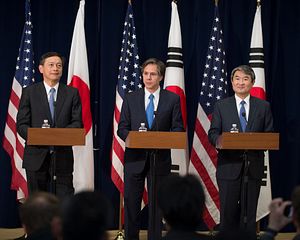On Friday, U.S. Deputy Secretary of State Antony Blinken hosted his Japanese and South Korean counterparts for trilateral talks in Washington, D.C. Vice Foreign Minister Akitaka Saiki represented Japan and Vice Foreign Minister Cho Tae-yong attended on behalf of South Korea.
Trilateral cooperation has been strained of late, due to tensions between South Korea and Japan over historical issues. Washington has taken every opportunity to nudge its two allies closer together, however. South Korean President Park Geun-hye has yet to hold a formal bilateral summit with Japanese Prime Minister Shinzo Abe, but U.S. President Barack Obama successfully pushed for the two to meet on the sidelines of the Nuclear Security Summit last year.
U.S. officials have been encouraged by some recent signs of a thaw in South Korea-Japan relations, such as the resumption of bilateral security talks at a “two-plus-two” meeting held on Tuesday. Washington would welcome closer relations between it two most important Asian allies.
In remarks after the meeting, Blinken spoke optimistically about “the increasingly global scope of our cooperation together.” He appealed to the “common values” that bind the three countries together – “principles like human rights, democracy, access to free and fair markets, and the paramount importance of rule of law.” But he also made clear that the U.S. is “not mediating between Japan and the Republic of Korea. “ Instead, Blinken said, “We are simply encouraging our closest friends to have the strongest possible relationship, because it matters to us.”
Saiki and Cho also tried to downplay the tensions between their two countries. “Despite some differences, of course, on some of the issues that lie between our ROK friend and Japan, we are talking to each other very seriously,” Saiki said. Cho added that, although Seoul will maintain “a principled position and stance on the issues of history,” South Korea’s government is still “promoting cooperation between Korea and Japan on issues, including North Korean issues and other issues where cooperation is necessary and where cooperation is beneficial.”
The discussions were wide-ranging, touching on climate change, energy security, global health, maritime security, the Ukraine crisis, and “challenges in the Middle East.” Naturally, however, the main focus was on the threat posed by North Korea. According to Cho, the three countries “reaffirmed close coordination on the North Korean nuclear issue.” Cho added more general that all three countries “reaffirmed the importance of the trilateral cooperation for promoting peace and prosperity in the East Asia region.”
On the maritime security front, Blinken and Saiki both expressed “concern” over China’s actions (particularly military actions) in the East and South China Seas. Blinken emphasized the importance of “strict adherence and respect for the rule of law” in resolving competing claims, and Saiki said that China “China, as a major power not only in this region but globally, has a responsibility to … abide by international law.” Cho, however, took a more moderate stance, refraining from using the word “concern” and instead emphasizing the importance of a code of conduct currently under negotiations between China and ASEAN.
Despite the optimism on display in the trilateral talks, South Korea’s Yonhap News cautioned that “any improvement in [Japan-South Korea] ties can easily be short-lived.” Pointing to recent controversies over new Japanese history textbooks, Yonhap argued that “genuine reconciliation between South Korea and Japan will be difficult to achieve unless Tokyo fundamentally addresses the sexual slavery and other historical issues.” South Korea will be watching closely as Abe speaks at the U.S. Congress this month, Yonhap said, and will be looking for a “sincere apology” for wartime atrocities.
































